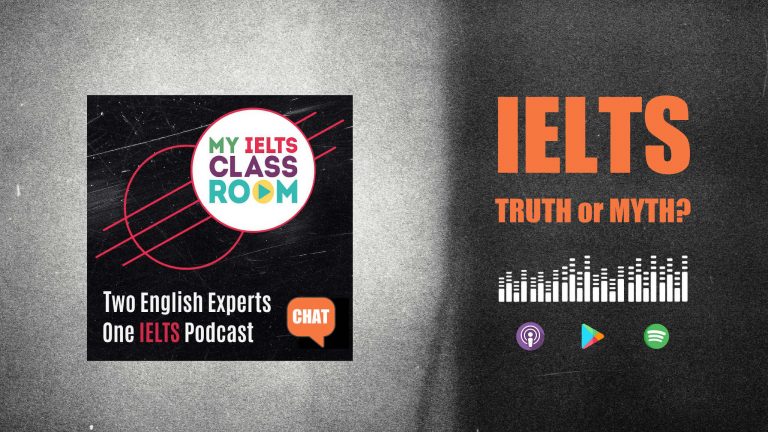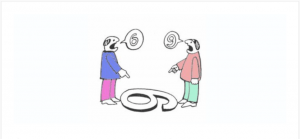
IELTS Truth or Myth?
One of the most difficult things for IELTS test-takers is knowing which information about the exam to trust. While online learning platforms are fantastic because they allow people to prepare at home, sites like Facebook and YouTube are also full of “facts” that are just not true. So, in today’s episode, Nick and I play a game of IELTS Truth or Myth! Yes, we will answer 15 questions from our viewers that start with the expression “Is it true that…” so you can start to feel confident about which IELTS rumours are true and which are pure invention!
This is a Patron Only Episode: Click here to support the show and gain access to the audio

https://www.patreon.com/myieltsclassroom
Below, you can find a summary of the episode, which includes all of the links to useful materials and the times of each part of the discussion (so you can go directly to the part you want to listen to). You can also find every free episode of the podcast here🚀
Subscribe to My IELTS Classroom podcast on Apple podcasts here
Subscribe to My IELTS Classroom on Google podcasts here
My IELTS Classroom Podcast Episode 6 Summary: IELTS Truth or Myth?
00:00 – 02:44 Introduction (My cat is meowing and Nick is making a bolognese pizza!)
02.45 – 05:44 Why are there so many myths about the IELTS test?
I think that it is understandable that there are so many myths about the IELTS test (a myth is a piece of information that people think is true, but is really false).
Firstly, the IELTS test is a bit like a black box – you can’t see your test paper after it has been marked, and you don’t know why you got a low score in speaking or writing. Therefore, when students get lower scores than they expect, they feel like “something is wrong” with the test (but almost never their performance!).

Also, everybody you meet online says that they are an “IELTS expert”, but the reality is that there are very few people who really truly understand what is required to do well in the test. Very often these teachers present their ideas about the test as though they are facts, when in fact they are invented pieces of information. Many of the teachers who do this do not realise that what they are saying is not correct, but sadly some might invent negative information about the test to cover the fact that their own teaching is poor.
05:06 – 07:23 Why don’t IELTS let you see your exam papers or your evaluation of results?
Developing accurate reading, listening or writing test questions takes a massive amount of time and effort, so the number one concern for any test creator is keeping an exam secure. For example, at my university, we have to delete all of the files on our computer the moment that we have finished editing an exam task and everything must be sent through encrypted email.
If IELTS gave test-takers their exam papers back, then they would never be able to use the questions in those tests again as they would be leaked and shared online in a heartbeat!
In short, secrecy = security.
Personally, I think that it would help students enormously if they were told the breakdown of their scores for speaking and writing (i.e. if they were told the individual score for each of the band descriptors). However, that is my feeling as a teacher. If I was writing the test for IELTS, I would be very happy with the current system!
Is it true that IELTS can be passed using a backdoor approach by paying for a fake IELTS certificate? (Sivaraj)
 07.24 – 10.34 No! This is a myth.
07.24 – 10.34 No! This is a myth.
If you do this, all you will be left with is a very expensive piece of paper and maybe a lifetime ban from entering a country or registering with a professional body. There is no way to bypass the genuine exam procedure. Even if somebody provides you with a fake certificate, this information will not be added into the official IELTS database and so it will be discovered very quickly by the migration officer or the university you are applying to.
This can have disastrous results for your future – I personally know of two students who tried to use a fake certificate and are now unable to enter the UK and Ireland because they were discovered.
NEVER try this! Spend your money on IELTS lessons instead.
This will not only help you to pass the test legally but also to improve your language level so you can function better in an English-speaking country in the future.
Is it true that some IELTS test centres are blacklisted and by taking the test there, we can face problems in embassy procedures? (Jaspreet)
10.35 – 13:21 No! This is a myth.
If the British Council or IDP thought that there was any corruption in a test centre, they would remove their license. IELTS can only work if there is universal faith in the value of every certificate
Is it true that it’s easier to pass IELTS if you’re going to take it in another country and not in your own country? (Anna)
13:23 – 18:40 This may be true!
However, before I explain, let me be clear on a few points:
- Every IELTS examiner, no matter if they are trained in IDP or British Council, or native or non-native, is trained using the same materials.
- Every examiner is going to assess your language using the same band descriptors.
- Ever examiner is regularly checked to ensure that they are marking to the IELTS guidelines.
However, every IELTS examiner is also human, and therefore might be influenced by their surroundings. My theory is that if a person has been teaching in one country for a long time, they may become used to the level of the language in that particular country. Therefore, if a student from another country appeared in your test, their level may seem slightly higher or slightly lower than the students the teacher is used to.

However, I really don’t think it is worth taking an IELTS holiday to another country to test this theory! The band descriptors are designed to test all people of al nationalities fairly. I would focus your efforts on improving your level so that you can get your desired band score in any country instead!
Is it true that writing scores vary according to the examiners. Some are lenient, some strict. Fact or myth? (Zahreen)
18:41 – 22:18 This may be true (but it wouldn’t make any real difference to your score!).
This question is very similar to the last one! Again, everybody uses the same band descriptors and applies them in the same way, but again every examiner is human. However, I think that all examiners do their very best to make their scoring accurate.
And remember, while it is OK for an examiner to be 0.5 away from a senior examiner’s score, if they give scores that are outside this, they will be asked to retrain or may even lose their examiner status. How would IELTS know that an examiner was scoring incorrectly? Well, they would either be discovered during their routine re-training OR if a student asked for a re-mark of their test.

If your scores are not what you expect, then you can always ask for an Evaluation of Results to check that your scores are accurate. However, I strongly recommend that you read this blog post before you do so. You really don’t want to waste any more money asking for an EOR, so you want to be really sure of success before you apply!
Is it true that a native English speaker examiner can give you a higher score in the speaking test than a local examiner? (Shehla)
22:19 – 24:23 Myth!
All non-native IELTS examiners have to be C2-level or above and, again, they use the same band descriptors and go through the same examiner training.
Is it true that the speaking test score is not only given by the speaking examiner. Instead the recording is heard by 2 or 3 more examiners and then the final score is given? (Noor)
24:24 – 27:09 Good question, but this is a Myth!
There are other Cambridge exams, like First Certificate, where the examiner interviews TWO students at the same time. Because keeping the conversation going between two (or in some cases three) test-takers is a very complex process, in these tests there is a second examiner who sits in the corner and gives the scores. In other words, you have one examiner to carry out the test, and one examiner to score.
IELTS is different. In this test, there is only you and the examiner, so it is possible for them to conduct the interview and give the scores at the same time.
It is true that you should not write above 255 or 260 words in an IELTS essay because you will lose marks and the examiner will stop reading? (Pramod)
27:10 – 29:19 Myth!
I have no idea why I see this information again and again online. It is totally false. There is no maximum word limit for IELTS. You are free to write as much as you like. As we said in our last episode, we recommend that you write between 180 and 220 words for Task 1 and 280 and 320 words for Task 2. However, the only thing that matters is that you reach the MINIMUM word count!
Is it true that the pass rate of UKVI is less as compared to academic IELTS? (Greg)
29:20 – 31:51 We don’t know!
We haven’t seen any statistics to confirm this, but there is no reason why the pass rate is lower as you are sitting a regular Academic IELTS paper. The only reason we can think of is that maybe some people find the extra security more stressful than the usual exam and this may affect their performance. However, in terms of the actual test, they are exactly the same.
Is true that if you sit for exams while your previous exam results are sent for re-evaluation, you won’t get your desired score? (Pramod)
31:52 – 36:23 Myth!
I have heard this many times, but there is no connection between any of your tests. I honestly don’t think that IELTS tracks people who sit multiple times (although obviously your test centre may recognise you). However, once you ask for an EOR, your paper will be sent to be marked by a senior examiner. That person will have no idea if this is the first time that you are sitting for the test or the tenth. All they will do is re-mark your paper and send it back to the test centre.
In fact, I know from personal experience that this is a myth as I have worked with a number of students who received a positive EOR back while they were waiting for the results of a second test. Hopefully, this will happen less and less as EOR’s are now being returned more quickly thanks to the centralised marking hubs and the computer-based test.
Is it true that in European countries, students taking the exam stay without food for a whole 5-6 hours straight? e.g. from 11 to 5 pm (Bea)
36:47 – 39:35 Myth!
I don’t really understand where this myth has come from, to be honest. You have to take the reading, listening and writing papers in one block without a break. However, that should take no longer than 3 hours, which is a completely normal amount of time to spend without eating. Plus, you can take a clear water bottle into the test, so you will be able to have a drink. In my experience, students are too stressed to eat during the test, but you can definitely go out for a lovely meal after your test to reward yourself!
Is it true that it is difficult to score a band 9 in writing even for native English speakers? (Lovepreet)
39:36 – 43:03 Truth!
Yes! Every year I work with around a dozen or so native speakers who need to take IELTS (these are usually people migrating to Australia) and while they generally do well in listening and speaking, they can also struggle in the two parts of the test that focus on academic skills as much as language. Writing can be a real issue for three main reasons:
- Native speakers may still write off-topic and not address the question.
- Native speakers often struggle to give a clear opinion in essays (often because they don’t have a clear enough understanding of the band descriptors).
- Native speakers may have issues with spelling and punctuation.
In fact, I recently worked with a very highly-educated Englishman who needed an 8.0 in writing but was able in three attempts to move up to that score. We only needed one 60 minute session to address his problems, but it was amazing how little he really understood about the band descriptors and how they affected his score.
This is why I say again and again that the only thing that really matters is writing essays, reports and letters that satisfy the band descriptors.
The truth is that getting a high IELTS score is as much about your academic skills and intelligence as it is your language.
This is why so many students are surprised when they get scores that are lower than they expected in the test.
Is it true that moving from band 6.0 to 8.0 in two months is impossible? (Julia)
43:03 – 47:49 Truth (unless you are Nick).
The research shows that you need 200 hours of study to move up one band. For most people, being able to study 400 hours in two months would be impossible. Plus, as we looked at in our first episode, if you score an 8.0, it means that you have a C1-level of language and for many students, that may never happen unless they go and live in an English-speaking country.
Obviously, there are exceptions!. Nick was able to go from an absolute beginner in Russian to B1/B2 level in two months, however, he was having six hours of lessons a day and had nobody to speak English with outside of class so he was FORCED to learn! (In contrast, I lived in Russia for 10 years and was still A2 when I left!).
My advice for any student is to be realistic. Learning a language takes time. There is so much lexis to learn and sentence structures to understand and while you might be able to cover the basics very quickly, moving up to the highest levels really does usually take a significant amount of time (and natural aptitude).
Is it true that its easier to get a high score with the British Council than IDP? Dimpee
48:33 – 51:10 Myth
We spoke about this at great length in our first episode – IDP and the British Council are two organisations who provide exactly the same products. Honestly, this question makes me sad because this is one I read again and again even though the answer should be clear. If you are worried about things like this, please don’t be. Try to funnel your energy into improving your language skills instead!
Is it true that IELTS has intentionally made the writing test tougher by assigning rigorous band descriptors so as to limit most of the well-qualified candidates below 7? Most importantly, they might have done it to generate extra revenue by forcing candidates to attempt the test multiple times.(Hussain, Abdelaziz, Leonardo, Anika and Arslan)
51:10 – END Myth
This is something that I hear again and again, but the truth is that IELTS is a NEUTRAL language -testing tool. In other words, all Cambridge, the British Council and IDP do is create the exam to accurately assess language based on the Common European Framework (CEFR).
It is governments, professional bodies or universities who decide what the scores they require are.
If you are frustrated that you cannot get your desired scores, it is these people you should blame, not IELTS.
For example, as we have discussed, right now the express entry for Canada (CLB9) is 8777. Why those scores? Because those give them just the right balance of applicants – not too many and not too few. It is Canada that decides!

In fact, if a country thinks it wants more or fewer migrants, then it can adjust the scores until the flow is correct. For example, Australia recently increased the scores they require to migrate. Why? They want fewer people to enter at the moment. In the same way, the scores needed to register as a nurse with the NHS in the UK was reduced recently – it used to be 7777, but now you can get a 6.5 in writing. Why? Did IELTS decide this? No! It was the British government.
However, is it true that more students get a 6.5 in writing than any other part of the test? Yes! And guess what? That is what we are going to discuss in the next week’s episode!
If you enjoyed our IELTS Truth or Myth episode, then remember, all of our live and video lessons are on our main website www.myieltsclassroom.com, which is where you can also sign up for our IELTS essay correction service or book a personal lesson with one of our IELTS experts. 🚀
(PS – Nick’s bolognese pizza came out really well! Email us at hello@myieltsclassroom.com if you want the recipe or to send us a photo of your favourite pizza!!!!!! ).

